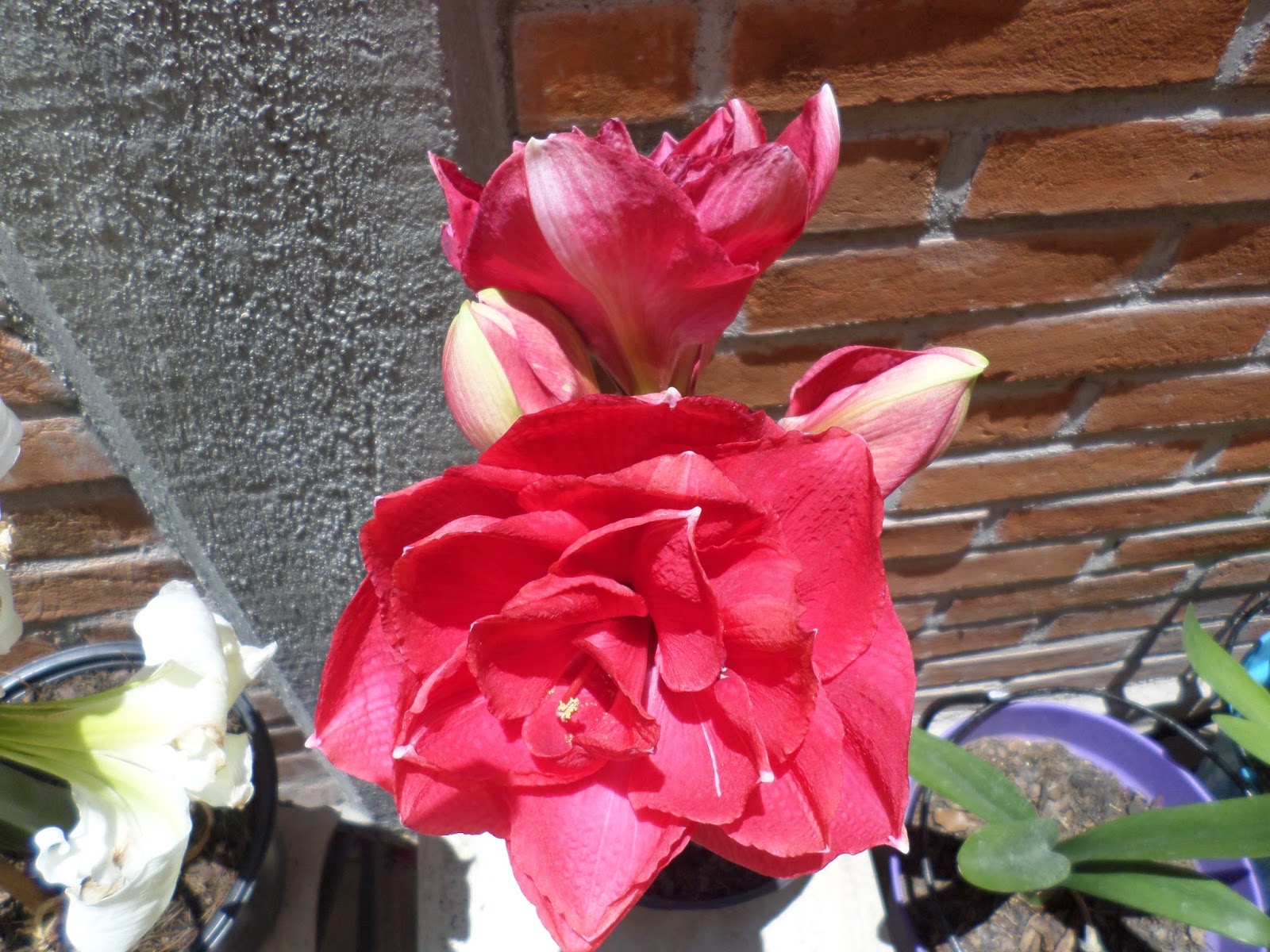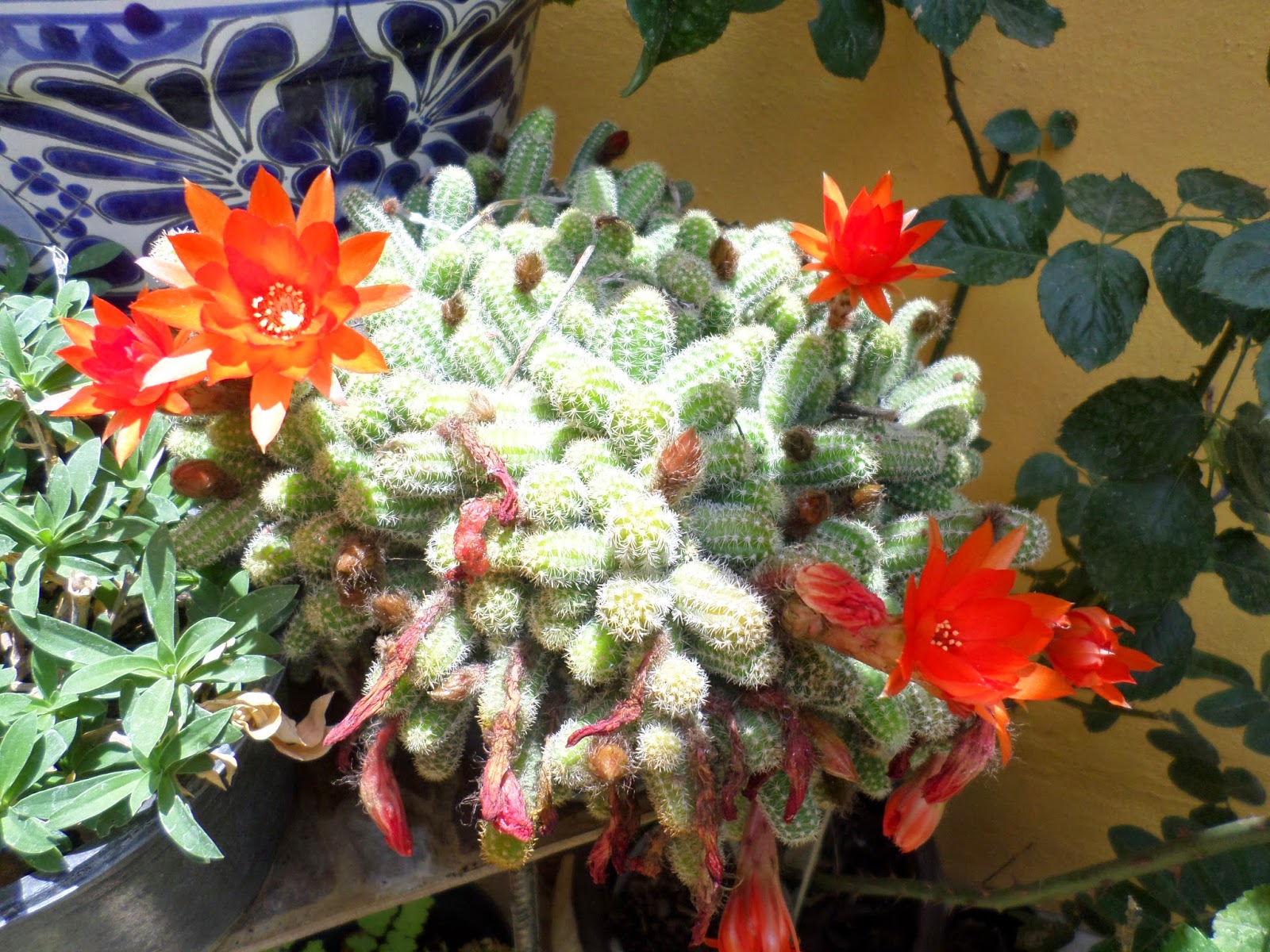Traveling around the world is a fascinating learning experience. I'm older, not much wiser. I miss my new friends and all the great souls all over the world who helped me along the path. I miss St. Petersburg and Moscow, Ukraine and Kiev, Chiang Mai and the folks at Full Dome. I wonder if I'll have a chance to do it all again. In the meantime there's nothing like going home. It's early spring here.
 |
| Jacaranda Trees at the Universidad de Guanajuato |
but here in Mexico everywhere you look there's flowers. It's been a colder winter than normal, but the birds are flying south now and there's plenty of hummingbirds in the trees.
The Bouganvillea spills over tiled roofs into the street...
And flowers bloom everywhere....In Bhagavad Gita, Krishna says,
patram puspam phalam toyam
yo me bhaktya prayacchati
tad aham bhakty-upahrtam
asnami prayatatmanah
yo me bhaktya prayacchati
tad aham bhakty-upahrtam
asnami prayatatmanah
So I offer a small bouquet of flowers to my friends and hope that they will be of service to you along with some reflections on the properties of flowers.
Earth laughs in flowers. ~Ralph Waldo Emerson, "Hamatreya"
The temple bell stops but I still hear the sound coming out of the flowers. ~Basho
Flowers... are a proud assertion that a ray of beauty out values all the utilities of the world. ~Ralph Waldo Emerson
Break open a cherry tree
and there are no flowers,
but the spring breeze
brings forth myriad blossoms.
~Ikkyu Sojun
Flowers seem intended for the solace of ordinary humanity. ~John Ruskin
Flowers don't worry about how they're going to bloom. They just open up and turn toward the light and that makes them beautiful. ~Jim Carrey
Pārijāta is a heavenly tree brought to earth by Krishna. A quarrel over it ensued between Satyabhama and Rukmini, Krishna's wives. But Krishna planted the tree in Satyabhama's courtyard in a way that when the tree flowered, the flowers fell in Rukmini's courtyard.
And when flowers are offered, there should be a bit of poetry as well. So here's Shakespeare.
I know a bank where the wild thyme blows,
Where oxlips and the nodding violet grows,Quite over-canopied with luscious woodbine,
With sweet musk-roses and with eglantine:
There sleeps Titania sometime of the night,
Lull'd in these flowers with dances and delight.
A Midsummer Night's Dream (2.1.255-60)
When daisies pied and violets blue
And lady-smocks all silver-whiteAnd cuckoo-buds of yellow hue
Do paint the meadows with delight,
Love's Labours Lost (5.2.900-4)
There's rosemary, that's for remembrance; pray,
love, remember: and there is pansies. that's for thoughts.Hamlet (4.5.170-1)
A violet in the youth of primy nature,
Forward, not permanent, sweet, not lasting,The perfume and suppliance of a minute.
Hamlet (1.3.9-12)
 |
| Orchids |
 |
| Aurora with Orchids
Please accpet this flower offering to all.
|
For those of you with a more philosophical slant, flowers represent ephemeral beauty. This world is temporary and the beauty of a flower is fugitive.
There's a Bengali bhajan by Govinda Das. It's called bhaja hunre mana. In the song there's a nice reflection on the lotus. He says our life is like a drop of water trembling on a lotus leaf.
(1)
bhajahū re mana śrī-nanda-nandana
abhaya-caraṇāravinda re
durlabha mānava-janama sat-sańge
taroho e bhava-sindhu re
(2)
śīta ātapa bāta bariṣaṇa
e dina jāminī jāgi re
biphale sevinu kṛpaṇa durajana
capala sukha-laba lāgi' re
(3)
e dhana, yaubana, putra, parijana
ithe ki āche paratīti re
kamala-dala-jala, jīvana ṭalamala
bhajahū hari-pada nīti re
(4)
śravaṇa, kīrtana, smaraṇa, vandana,
pāda-sevana, dāsya re
pūjana, sakhī-jana, ātma-nivedana
govinda-dāsa-abhilāṣa re
TRANSLATION
1) O mind just worship the lotus feet of the son of Nanda, which make one fearless. Having obtained this rare human birth, cross over this ocean of worldly existence through the association of saintly persons.
2) Both in the day and at night I remain sleepless, suffering the pains of the heat and cold, the wind and the rain. For a fraction of flickering happiness I have uselessly served wicked and miserly men.
3) What assurance of real happiness is there in all of one's wealth, youthfulness, sons, and family members? This life is tottering like a drop of water on a lotus petal; therefore you should always serve and worship the divine feet of Lord Hari.
4) It is the desire and great longing of Govinda Dasa to engage himself in the nine processes of bhakti, namely hearing the glories of Lord Hari and chanting those glories, constantly remembering Him and offering prayers to Him, serving the Lord's lotus feet, serving the Supreme Lord as a servant, worshiping Him with flowers and incense and so forth, serving Him as a friend, and completely offering the Lord one's very self.
Srila Prabhupada comments on this song in a lecture givine in San Francisco, March 16, 1967:
Then he says, kamala-dala-jala, jīvana talamala. Kamala-dala-jala means the lily, lily flower. You have all seen lily flower on the lakes. They are tottering, always in the water. Tottering. Any way, any time, it can be overflooded. Similarly, this life is full of danger always, always in danger. Any moment it can be finished. There are so many instances. People look it, but they forget. That is the wonderful thing. They are seeing every day, every moment, that he is himself in danger, others are in danger. Still, he is thinking that "I am secure." This is the position. So life is very tottering and in dangerous position. Therefore one should take advantage of this human form of life and immediately engage in Kṛṣṇa consciousness. That should be the request of everyone to his mind, "My dear mind, don't drag me in the dangerous position. Please keep me in Kṛṣṇa consciousness." Thus Kṛṣṇa consciousness, how it can be achieved, that is also being described by Govinda dāsa. He says,
- śravaṇa, kīrtana, smaraṇa, vandana,
- pāda-sevana, dāsya re,
- pūjana, sakhī-jana, ātma-nivedana
- govinda-dāsa-abhilāṣa re
Abhilāṣa means aspiration, hope, or ambition. He is ambitious of becoming a devotee in nine different ways. The first thing is śravaṇa. Śravaṇa means hearing. One has to hear from authorities. That is the beginning of spiritual life or Kṛṣṇa consciousness. Just like Arjuna. He achieved his spiritual consciousness, or Kṛṣṇa consciousness, by hearing from Kṛṣṇa. Similarly, one has to hear from Kṛṣṇa or from the representative of Kṛṣṇa. One who presents Kṛṣṇa's words as it is—from him one has to hear because at the present moment we have no opportunity to hear directly. To hear directly from Kṛṣṇa is there. The arrangement is there. Kṛṣṇa is situated in everyone's heart, and one can hear from Him very easily, anywhere and everywhere, but he must have the training how to hear. For that purpose one requires the help of the representative of Kṛṣṇa. Therefore Caitanya Mahāprabhu says that one can achieve devotional service of Kṛṣṇa by the combined mercy of Kṛṣṇa and the spiritual master. Guru-kṛṣṇa-kṛpāya pāya bhakti-latā-bīja (CC Madhya 19.151). By the grace of spiritual master, guru, and by the grace of Kṛṣṇa, one achieves the opportunity of serving Kṛṣṇa in devotional service. So in the Caitanya-caritāmṛta it is also said that spiritual master is the direct manifestation of Kṛṣṇa. Kṛṣṇa comes before the devotee as spiritual master just like sun enters your room by the sunshine. Although the sun does not enter your room or your city or your country—he is so many millions and millions of miles away—still, he can enter everywhere by his potency, the sunshine. Similarly, Kṛṣṇa enters everywhere by His different potencies. And to receive this light from Kṛṣṇa, one has to hear. Hearing is so important. Therefore Govinda dāsa says, śravaṇa. Śravaṇa means hearing. And one who has heard nicely, his next stage will be kīrtanam. Just like our boys who have heard a little nicely, now they are very eager to chant, going from street to street. This is natural sequence. It is not that you hear, but you remain stopped. No. The next stage will be kīrtanam. Either by chanting vibration or by writing or by speaking or by preaching, the kīrtana will be there. So śravaṇaṁ kīrtanam, first hearing and then chanting. And hearing and chanting about whom? About Viṣṇu, not for any nonsense. Śravaṇaṁ kīrtanaṁ viṣṇoḥ (SB 7.5.23). These things are stated in the śāstra. The ordinary people, they are also engaged in hearing and chanting. They are hearing in the newspaper of some politician, and the whole day they are discussing and chanting, "Oh, this man is going to be elected. This man is going to be elected." So hearing and chanting is there everywhere. But if you want spiritual salvation, then you have to hear and chant about Viṣṇu, nobody else. Śravaṇaṁ kīrtanaṁ viṣṇoḥ. So the poet sings, Śravaṇa, kīrtana, smaraṇa, vandana, pāda-sevana, dāsya re. So there are different processes: hearing, chanting, remembering, worshiping in the temple, engaging oneself in the service. So he is desiring all nine kinds of devotional service. Ultimately, pūjana sakhī-jana. Sakhī-jana means those who are confidential devotees of the Lord, to please them. And ātma-nivedana. Ātmā means self, and nivedana means surrender. Govinda-dāsa-abhilāṣa. The poet's name is Govinda dāsa, and he expresses that his desires are only this. He wants to utilize the opportunity of his human form of life in this way. This is the sum and substance of this song.
So please accept this humble flower offering and I hope that spring comes to you soon. Dandavata to all.






















No comments:
Post a Comment
Note: Only a member of this blog may post a comment.